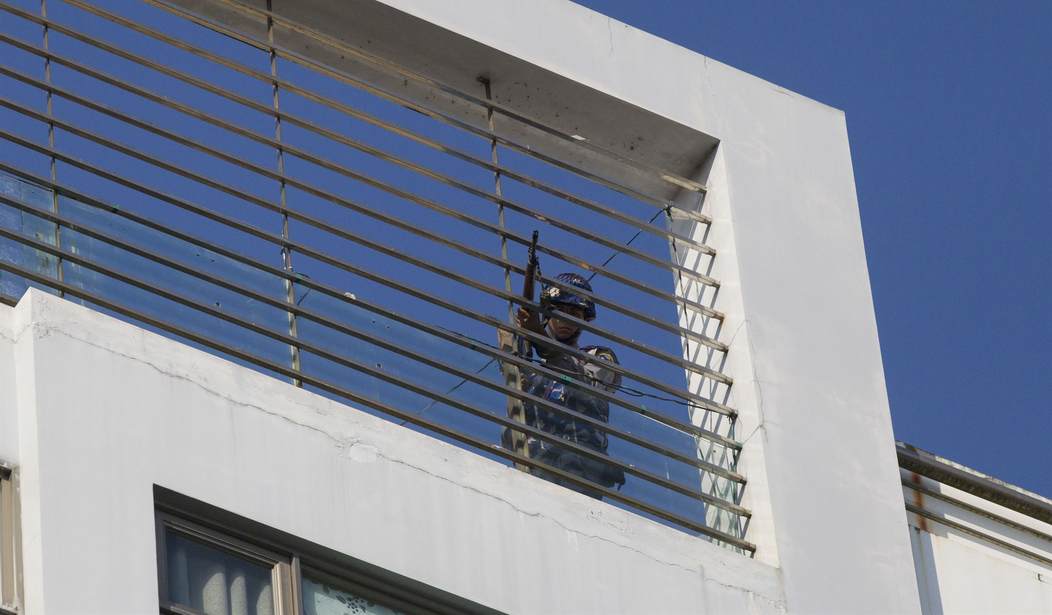At least 38 unarmed protesters in Myanmar were shot and killed by the military on Wednesday, as CNN declared that the country is now a “war zone.” I’d argue that a war actually involves two sides shooting at each other. What we’re witnessing in Myanmar at the moment is a massacre, because civilians aren’t shooting back. In fact, in Myanmar they’re not even allowed to possess a firearm.
On paper, Myanmar law recognizes the right to own a firearm; kind of like how New Jersey recognizes the right to carry a gun in self-defense. In practice, legal gun ownership in Myanmar and the ability to carry a firearm in New Jersey are restricted to a chosen few, with government officials doling out permission to just a handful of individuals.
As reporter Kyaw Lin Htoon of the website Frontier Myanmar reported in 2018:
Legal experts say the right of citizens to own firearms for self-defence has been eroded by successive governments over the years. Instead of making a decision based on whether a person needs a firearm for self-protection, these governments have instead handed out licences as a privilege to their loyal followers, legal experts claim.
“There is a need to enact a new law or draft a policy which guarantees that citizens have the right to self-protection,” said lawyer U Khin Zaw (Mayangone), adding that citizens would otherwise be unable to prevent themselves from becoming victims of serious crimes, such as armed robbery, banditry and kidnapping.
After General Ne Win seized power in 1962, the ruling Revolutionary Council military government ordered the confiscation of all firearms owned by citizens. It would hold onto these firearms for well over a decade, and most would not be returned to their original owners.
After the transition from a military regime to the Burma Socialist Programme Party government, the government implemented a new policy on firearms in 1977 that resulted in the repeal of three orders issued by the democratic government in 1959 under the 1951 act.
Although the policy is the cause of many complications, legal experts say its intent was to ensure that confiscated licensed firearms were distributed among members of the BSPP and retired civil servants, including former members of the Tatmadaw, rather than returning them to their original owners.
Lawyer U Kyi Myint says that Myanmar firearms laws have generally given the authorities significant discretion in dispensing licences, stating only that they should go to people of “dignity” and “good character”.
Sounds a lot like the subjective-issue carry licenses in states like New York, New Jersey, Maryland, and California, doesn’t it? The government has the discretion to determine who is of “good character,” and not surprisingly, the authorities have decided that the average citizen doesn’t meet that standard.
Kyi Myint said this was not a problem during the post-independence democratic government, but subsequent military administrations gave priority for firearms ownership to high-profile military veterans and those with whom the juntas were closely associated.
“None of these decisions met the norms of democracy,” said Kyi Myint, who is also chair of the Union Lawyers’ and Paralegals’ Association. “The government and parliaments need to decide what to do; whether to continue the procedure inherited from the military dictatorship or introduce legislation based on that used by the AFPFL [Anti-Fascist People’s Freedom League] government,” he said, referring to the government that ruled from independence to 1958, when it split into factions.
With the military having overthrown the government in a coup, there’s nothing that the country’s Parliament can do at the moment to ensure that citizens can own a firearm for self-defense.
I’m sure that there are folks out there who would argue that it’s better that the pro-democracy forces in Myanmar have been disarmed by the government’s gun control laws. After all, who would be in favor of a civil war?
Well, if the choice is between a civil war and the government slaughter of unarmed citizens, I’m going with the option that allows people to fight back. The good options are off the table. The question now is whether you think it’s better that the military be able to slaughter citizens with impunity, or if they should fear the prospect of the people shooting back.
Outside help is not coming for the people of Myanmar. No U.S. troops are going to descend on Mandalay to topple the coup. The blue helmets of the United Nations are not going to ride to Myanmar’s rescue. At the most, countries will try to impose economic sanctions on the military regime, but China looks willing and ready to flex its muscle and support the generals who’ve seized power, which makes the prospects of regime change via sanctions a non-starter.
Dozens of protesters have been murdered by Myanmar’s military forces in the past few days, and the bloodshed shows no signs of stopping. The country is not a war zone, contrary to CNN’s claims. Right now it’s a killing field, and a grim reminder of why our own right to keep and bear arms is so important as the last defense against totalitarian tyranny.








Join the conversation as a VIP Member